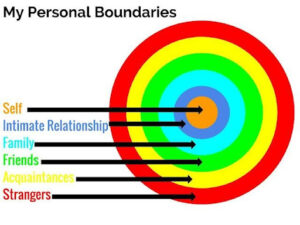- Posted on
Personal Boundaries

Written by Viktoriya Lakhir
The concept of personal boundaries is one of the most popular topics in the field of psychology. For sure, each of you at least once heard the phrases “He / she violates my personal boundaries”, “I try to defend my personal boundaries”, “I have no personal boundaries”, etc. Have you ever thought about the meaning of this notion, why are they so important, how they affect our life and how to define our personal boundaries? The issue of building and protecting personal boundaries is relevant throughout the life for every person. I think a lot of people have faced the problem of not being able to build and protect personal boundaries. Even the most mentally healthy individuals from time to time face difficulties in this area, since relationships with others are one of the main factors in life. Accordingly, this article is devoted to the formation and protection of personal boundaries aimed at building healthy and harmonious relationships with oneself, others and the world.
What are personal boundaries?
According to Luna (n.d.), “Personal boundaries are an essential part of creating and upholding a healthy self-image”. In other words, these are rules, interests, beliefs, principles, values and restrictions established in relationships with other people. In research from Riley (2021) concept of personal boundaries is necessary to protect the personality and its components such as time, energy, feelings, emotions, sexuality, personal space, ethical, cultural and religious values. Also, it should be noted too high, impenetrable boundaries can become a problem and gradually lead to social isolation. Whereas, the lack of personal boundaries threatens to lose identity and create stress from outside interventions (Riley, 2021).
Violation of personal boundaries
Do you have a friend who can call you at any time of the day and complain in detail about breaking up with a boyfriend, while not at all interested in receiving feedback but using you as a free psychologist? Do you have such friends who perceive your home as their own and can also come to you uninvited at any time of the day? Do you have colleagues who asked for money and did not give it back for a long period of time, but when you try to remind them, they accuse you of being materialistic? Do you have a boss who has forgotten that slavery was abolished in 1961 and sincerely believes that you should work extracurricular for all your colleagues and be grateful for the honor you have been given? Or maybe you have friends who believe that if you are a psychologist then you should consult them for free 24 hours a day, anytime and anywhere?

All of the above situations are prime examples of personal boundary violations. Sooner or later, most people are needed to establish a balance between their personal interests and the demands of society. According to Ulashevich (2019), everyone has the right to have their own thoughts, opinions and feelings; everyone needs personal space, understanding and satisfaction of their own needs. Unfortunately, people with no or violated personal boundaries sometimes find it difficult to understand and accept this fact. People with violated personal boundaries are often forced to expend enormous amounts of energy trying to “maintain a relationship.” Why is this happening? The most common reason for these actions is the fear of losing relationships with loved ones, friends, family members, colleagues, and bosses. Such people often follow actions that contradict their attitudes, interests, and private plans (Ulashevich, 2019). Human insecurity, inability to meet their own needs and desires is the main trap of being manipulated by others and destructive stereotypes.
How to know if your personal boundaries are violated?
The main signs and causes of violated boundaries
The main indicators of violation of personal boundaries are destructive emotions:
- Irritation
- Dissatisfaction
- Anger
- Sadness
- Fear
In research from Foster (2014), not all people respond to internal discomfort indicating violations of personal boundaries. Quite often, those people whose boundaries have been violated tend to accumulate negative emotions caused by the offender and wait for the moment until the person realizes his mistake. Nevertheless, based on practice, those who have offended you and violated your boundaries do not understand the wrongness of own actions. Accordingly, an important step towards a peaceful life is the formation and protection of your “territory”.
Signs of Weak Personal Boundaries
- You have to constantly make excuses or make excuses for the aggressor instead of fighting back
- You continue to communicate with those who do not respect you.
- You trust others’ opinions more than your own.
- You often feel angry.
- You don’t know how to say NO
- You feel responsible for the feelings of others.
- You are afraid to disagree with others’ point of view, and always try to be nice and comfortable to others.
- Other people teach you how to live, build relationships with your loved one, wife / husband, how to raise children, what to do in different situations
How to establish and protect personal boundaries
 According to Borodina (2020), flexibility is one of the most important qualities of personal boundaries, which can change according to communication with different people and life circumstances. No one has the right to accuse you of double standards and hypocrisy if a certain context makes communication with someone or a situation uncomfortable for you. On the contrary, the main goal of the flexibility of boundaries is to properly distribute energy and fight with internal discomfort. Factors such as mentality, upbringing, culture, personality and character traits, life experience, family relationships and the current life situation can influence the formation of an individual’s personal boundaries (Borodina, 2020). In order to understand them, you can answer several questions.
According to Borodina (2020), flexibility is one of the most important qualities of personal boundaries, which can change according to communication with different people and life circumstances. No one has the right to accuse you of double standards and hypocrisy if a certain context makes communication with someone or a situation uncomfortable for you. On the contrary, the main goal of the flexibility of boundaries is to properly distribute energy and fight with internal discomfort. Factors such as mentality, upbringing, culture, personality and character traits, life experience, family relationships and the current life situation can influence the formation of an individual’s personal boundaries (Borodina, 2020). In order to understand them, you can answer several questions.
- What am I entitled to? Identify your boundaries
The right to say NO without feeling guilty. The right to think about one’s desires and needs more than the needs of others, the right not to live up to someone’s expectations, and most importantly, the right to make mistakes.
- What do you feel? Listen your feelings
Start to check out your feelings, physical symptoms, and emotions in a variety of situations. How do you feel when someone wants to discuss your private life? How do you feel when your boss once again asks you to stay in the office, when someone asks a question regarding politics, or asks you to borrow money?
- What do you value? Determine your values
Personal boundaries should always be aligned with your values. Write a list of your preferences of how you would like to be treated by others. What is acceptable to you and what is not? What do you feel? What things, people and life situations make you live contrary to your ideals? Understanding these factors will help identify pressure points.
- Learn to refuse- Be able to say NO
Sometimes you don’t have to be persistent when explaining why something is uncomfortable to you. It is enough to say “NO” right away and thereby get rid of future problems.
“Setting personal boundaries does not mean we become selfish, it means we become assertive, confident, have self-awareness and encourage our own mental well-being” (Foster, 2014).
Conclusion
Properly established personal boundaries allow you to build life according to your plans, standards, interests and rules. A person with weak personal boundaries or their absence is immediately visible: he is living someone else’s life. He has an unloved job, regular stress, irritability, forced communication with uninteresting individuals. This type of people always tries to be needed by someone, puts the desires and interests of others above their own. Each of us must learn to take responsibility for own emotions and always control internal states. Limiting the access of people around us from manipulating our feelings and emotions is the first step in establishing the protection of own boundaries. Following provocations and responsiveness, on the contrary, leads to a violation of personal boundaries. A mature person knows how to control his own actions, does not respond with negativity to negativity, and is responsible for his emotional state.
References
Borodina, V. (2020, May 18). How to Create and Protect Your Personal Boundaries. Style. Retrieved May 18, 2020, from https://style.rbc.ru/health/5e543be19a7947b60d838f09
Foster, T. (2014, September 17). Personal boundaries – what are they are why are they important. Counselling Directory. Retrieved September 17, 2014, from https://www.counselling-directory.org.uk/memberarticles/personal-boundaries-what-are-they-are-why-are-they-important
Luna, A. (n.d.). 18 Signs You Lack Personal Boundaries (and Feel Constantly Used). Loner Wolf. Retrieved August 3, 2021, from https://lonerwolf.com/personal-boundaries/
Riley, D. (2021, January 12). 9 Ways to Build and Keep Healthy Personal Boundaries. Lifehack. Retrieved January 31, 2021, from https://www.lifehack.org/874872/personal-boundaries
Ulashevich, T. (2019, June 18). Personal boundaries of a person. Psychologists. Retrieved June 18, 2019, from https://www.b17.ru/blog/122299/



